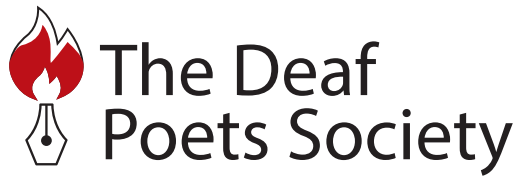Ava C. Cipri, Cyrée Jarelle Johnson, and Sarah Katz
Editors' Note
[Image Description: A visual collage of an upside down sunset, a sideways fence, half a tree, and birds morphing into a human figure who is desperately trying to catch something.] Work by Anastasia Keck.
As founding editors of The Deaf Poets Society—and as sick and disabled poets ourselves—we’ve set our sights on building a platform to amplify the voices of our fellow crips. This issue is our first go at achieving this goal, and we hope that it cracks that proverbial ceiling of beliefs about the disabled body. To say the least, we found reading work from every poet who submitted a challenging, critical process—and, above all, as a gift to ourselves and our community.
We wanted to hear the stories of those living boldly, like us, and often close to the edge. We wanted poems that illuminate the complex constellation that is our lives, poems that seethe from visions and thoughts that only a person with a disability could have. We wanted to present the work of those giving life and shape and form to wide-ranging experiences of disabled life—as a woman, as a Black person, as a member of the LGBTQ community—and then to submerge readers in that transformative ocean.
We sure got them. These are poems that dive deeply into expeditions of bodily consciousness, cresting the waves of a spine with its tender / earthquakes and meeting at nerves that are raw scarabs (“I was thinking about trying to teach myself to play guitar in secret,” by Jen Stein). The poems upend metaphor: forty miles of bad road (“Bad road” by Leah Lakshmi Piepzna-Samarasinha); negotiate with the experience of an exorcism: i won't believe the hands of my root woman can pull me out (“Playing the D’s” by Ashley Young); and meet with Beethoven in the flesh (“Counterpoint” by Raymond Luczak). These poems investigate bodily knowledge and its tendency, sometimes, to act apart from the wills of the mind.
Altogether, this inaugural issue includes twenty-three poems from thirteen poets whose sensibilities and voices range considerably, but are united in a fierce desire to see beyond the current rhetoric about disability. You’ll notice that space in all its forms frequently appears as a motif. Celestial space is one image, but the spaces of silence, anxiety, nostalgia, tinnitus, birdsong, and even disco appear also. In addition, the prose poems in this issue take up space on the page, and, depending on a poem's content, makes certain demands of its readers; the lineated poems pull us slowly through, their elements lingering in the way that chronic pain lingers in us, ever-constant; and still other poems pinball across the page, giving form to frenetic sensory experience.
Ultimately, these are poems borne out of a necessary vulnerability and an intense love. We love this work and are honored to present this issue to you.
